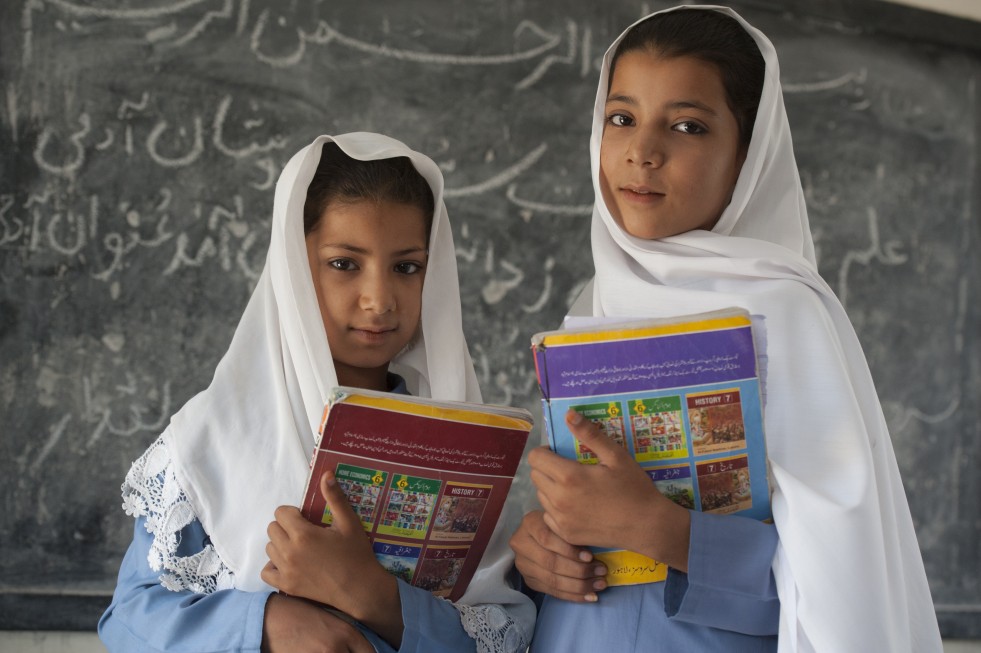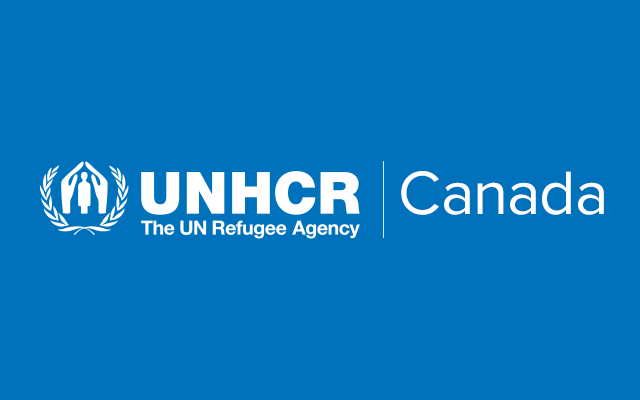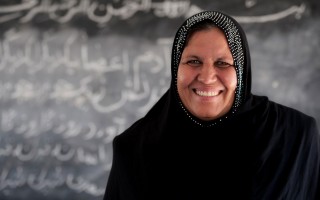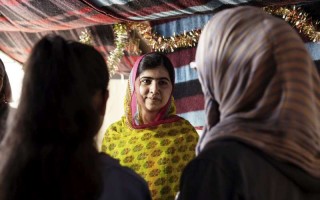
Haseena, nine years old, left, and Nadia, twelve years old. The sisters are the second generation of Afghan refugee girls to attend Asifi’s school. Their mother, Salma, was among the first girl students two decades ago. © UNHCR / S. Rich
Like millions around the world, I have been moved by the recent public outcry and spontaneous acts of solidarity towards refugees in Europe. It has been riveting to watch, as well as greatly encouraging. As an Ambassador for UNHCR, the UN Refugee Agency, I have been overwhelmed by the support for the organization’s efforts in Europe, where UNHCR has delivered tents, blankets, food and other essential items that refugee families so desperately need in this period of emergency.
But what next? What happens when the dramatic images fade from our TV screens?
They must not fade as well from our collective consciousness. As incredibly trying as this initial emergency as been for all involved parties, this is when the hard work truly begins. It is vital to remember that the average length of time a refugee lives in exile is over 15 years, be it in a camp in Jordan or Uganda, an informal settlement in Lebanon or Thailand, or resettled in the US or Europe. That is a long time, and thus the difficult work ahead lies in making sure the refugees remain contributing, productive members of society. The hard work lies in ensuring that refugees have access to education and vocational skills training, because this is in the best interests of everyone – the host country, the refugees, and the home to which they eventually hope to return.
Far too often, refugees are viewed as burdens. In reality, refugees often become some of the most dynamic members of society. It is well known that Einstein was a refugee, as was Marlene Dietrich, and Madeleine Albright, George Soros, Sigmund Freud, Isabelle Allende, to name just a few. But there are millions of other names, less celebrated but no less heroic refugees, working quietly, anonymously, often under difficult and dangerous circumstances. Aqeela Asifi, whom UNHCR has announced as this year’s Nansen Refugee Award laureate in recognition of her extraordinary commitment and exceptional service to refugees, is one such name.
In 1992, at the age of 26 years, Asifi fled the Mujahedeen siege of Kabul, Afghanistan, with her husband and two small children, and arrived in the remote Kot Chandana refugee village in Pakistan. When she first fled her native country, she thought it would be a matter of months before she was home once more.
But she soon realized what all refugees know: in the midst of the noise and chaos and trauma of fleeing your country, your focus is on the immediate. You want to protect your children and seek sanctuary. You want to simply survive. It takes time to process fully that going home anytime soon is an improbable dream; that your life has been re-set at zero; that you have to build it back up from nothing. When this acceptance does eventually set in, a shift happens, from survival to resilience, and with it a determination to be strong, move forward, and create anew.
Asifi’s children had seen their education interrupted by war and displacement. As a former teacher, she could not watch them languish in a state of arrested development. She was struck by the lack of schools in Kot Chandana and a total absence of learning opportunities for girls. Having won the backing of the village elders, Asifi went door-to-door convincing reluctant parents to let her tutor their girls. With 20 pupils, a tent, hand written worksheets, and above all, fierce determination, she started a school.
Asifi’s tiny school blossomed and she received funding from the Pakistani government. Asifi expanded the school to six tents and began including local Pakistani girls as well. Today, the school is a permanent building. Asifi has transformed the lives of over 1,000 girls, and her efforts have encouraged another six schools to open with a further 1,500 girls and boys enrolled.
As a writer, I believe more in the power of words than numbers. But there are numbers scrawled in the margin of Asifi’s tale that we should not ignore. At UNHCR, it is well known that educated Afghans are three times more likely to repatriate than stay in their country of refuge. Education, instead of anchoring refugees in Pakistan, has been a mobilising factor for people returning to Afghanistan. Education helps protect refugee children from illiteracy, abuse, and exploitation via child labour, forced early marriage, or recruitment to armed groups. Education offers refugees a pathway out of poverty, gives them the skills to build themselves and their country a stable, secure, and prosperous future when they return home. Globally over 50% of refugees are children. Yet only one in every two refugee children attends primary school. Only one in four refugee adolescents receives secondary school education.
I hope, when the media spotlight inevitably moves away from the current crisis in Europe, that the awareness and goodwill of the public towards refugees across the world remains strong, that we remember that refugees need more than just emergency support. They need the hope of a future, as we all do. I hope we remember that refugees make lasting contributions to their host nations. Above all, we must remember that, in our increasingly inter-connected world, an investment in their future is an investment in ours too.
For more info on UNHCR’s response to the refugee crisis in Europe please visit: www.unhcr.org
___________________________
Khaled Hosseini and UNHCR:
Afghan-born American author Khaled Hosseini has won international acclaim for his three best-selling novels The Kite Runner, A Thousand Splendid Suns, And The Mountains Echoed.
At the age of fourteen, Khaled’s family was forced to seek asylum in the USA due to the Soviet invasion of Afghanistan. As a refugee himself Khaled has a profound understanding and recognition of the importance of UNHCR’s work.
Khaled has made several visits to see UNHCR’s frontline work for refugees including to Afghanistan, Chad, Iraq (in 2014) and now Jordan. After one particular journey back to Afghanistan, Khaled established The Khaled Hosseini Foundation which partners with UNHCR and raises funds to build homes for thousands of refugee returnees as well as providing economic opportunities, education and health care for vulnerable women and children.
In 2013, Khaled was appointed a UNHCR Goodwill Ambassador in recognition of his many years of commitment to UNHCR and his tireless work on behalf of refugees





